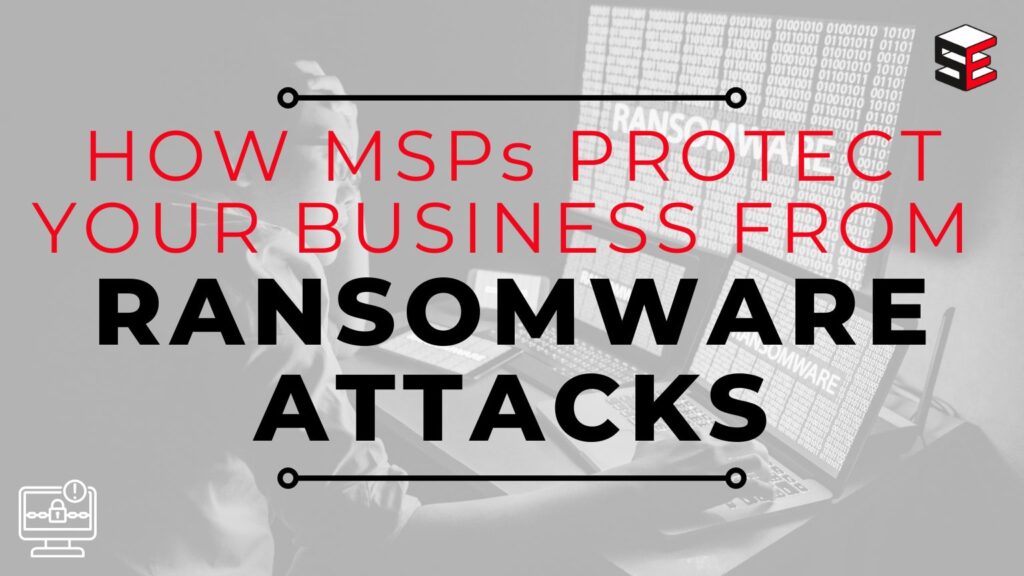In recent years, ransomware has emerged as one of the most devastating cyber threats to businesses of all sizes. These attacks involve malicious software that encrypts a company’s data, making it inaccessible until a ransom is paid. The consequences of a ransomware attack can be severe, including financial loss, reputational damage, and operational disruption. For businesses that rely on technology to conduct day-to-day operations, partnering with a Managed Services Provider (MSP) is a crucial step in safeguarding against this growing threat.
MSPs play a vital role in securing businesses against ransomware by offering a range of proactive measures, real-time monitoring, and rapid response protocols. Here’s how MSPs protect your business from ransomware attacks:
1 – Proactive Security Measures
MSPs take a proactive approach to cybersecurity, ensuring that your systems are continuously updated and protected. One of the key defenses against ransomware is ensuring that all software, including operating systems and applications, is kept up to date. MSPs implement automated patch management systems to ensure that vulnerabilities are addressed before they can be exploited by cybercriminals. Additionally, MSPs typically deploy endpoint protection tools, which monitor and detect suspicious activity on individual devices connected to the network. These tools can block known ransomware variants and provide early detection of potential threats.
2 – Advanced Threat Detection and Monitoring
Ransomware attacks often rely on evading detection long enough to cause damage. MSPs utilize advanced threat detection tools that monitor network traffic, user behavior, and system activity for any signs of malicious behavior. These monitoring tools are designed to identify anomalies and indicators of compromise (IOCs) associated with ransomware attacks, often before the attack fully materializes. By providing round-the-clock monitoring, MSPs can quickly identify and respond to emerging threats, helping to stop ransomware attacks before they escalate.
3 – Backup and Disaster Recovery Solutions
Ransomware attacks typically result in the encryption of valuable data, making it unavailable for business operations. In some cases, attackers may demand payment in exchange for decryption keys. However, paying the ransom does not guarantee the return of data, and it only fuels further criminal activity. MSPs implement robust backup and disaster recovery solutions to minimize the impact of ransomware attacks. By maintaining regular, encrypted backups of critical data, MSPs ensure that even if an attack occurs, businesses can quickly restore their data from secure, off-site backups. These backups are tested regularly to ensure their reliability in case of a data recovery scenario.
4 – Employee Training and Awareness
Human error remains one of the most common entry points for ransomware attacks, often through phishing emails or malicious links. MSPs help mitigate this risk by providing cybersecurity training to employees. This training covers the identification of phishing attempts,
safe web browsing practices, and proper data handling procedures. By educating employees on the dangers of ransomware and the tactics used by cybercriminals, MSPs reduce the likelihood of successful attacks. This human-centric layer of security is crucial in creating a strong defense against ransomware.
5 – Incident Response and Containment
In the unfortunate event that a ransomware attack does breach a company’s defenses, MSPs are equipped with incident response protocols to contain the damage and mitigate the attack’s effects. MSPs work quickly to isolate infected systems, prevent the spread of malware, and initiate recovery processes. This rapid response helps to limit the downtime and operational disruption caused by the attack. Moreover, MSPs typically have relationships with cybersecurity experts, forensic analysts, and law enforcement, which can be valuable for tracing the origin of the attack and preventing future incidents.
6 – Compliance and Regulatory Support
Many industries are subject to stringent data protection regulations, such as HIPAA or PCI DSS, which impose specific requirements for data security. Ransomware attacks can result in breaches of compliance, leading to legal and financial penalties. MSPs help businesses navigate the complex landscape of cybersecurity compliance by ensuring that their systems and data management practices align with industry standards. By leveraging MSPs for compliance assistance, businesses can ensure that their cybersecurity protocols meet the necessary legal requirements, thus avoiding additional risks associated with non-compliance.
Ransomware poses a significant threat to businesses, but the expertise and resources provided by MSPs can offer comprehensive protection. From proactive security measures and threat detection to robust backup solutions and employee training, MSPs provide a multi-layered defense that strengthens your overall cybersecurity posture. As cyber threats continue to evolve, partnering with an MSP ensures that your business is not only protected from ransomware attacks but also well-prepared to recover if an attack does occur. This partnership is an essential investment in the long-term security and success of your business.

